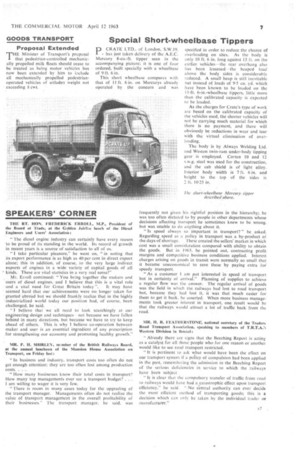SPEAKERS' CORNER
Page 9

If you've noticed an error in this article please click here to report it so we can fix it.
THE RT. HON. FREDERICK ERROLL, M.P., President of the Board ot Trade, at the Golden Jah!Le lunch of the Diesel Engineers and Users' Association: "The diesel engine industry can certainly have every reason to be proud of its standing in the world. Its record of growth in recent years is a source of satisfaction to all of us.
"I take particular pleasure, " he went on, " in noting that its export performance is as high as 40 per cent in direct export alone; this in addition, of course, to the very large indirect exports of engines in a wide variety of capital goods of all
• kinds. These are vital statistics in a very real sense!" Mr. Erroll continued: " You bring together the makers and • users of diesel engines, and 1 believe that this is a vital role
• and a vital need for Great Britain today ". It may have seemed hatd that our achievements were no longer taken for granted abroad but we should frankly realize that in the highly 'industrialized world today our position had, of course, been challenged, he said.
I believe that we all need to look Searchingly at our engineering design and techniques---nor because we have fallen behind in many directions, but because we have to try to keep ahead of others. This is why I believe co-operation between maker and user is an essential ingredient of any prescription for strengthening our economy and promoting healthy growth."
MR. P. H. SHIRLEY, nt?mber of the British Railways Board, at the annual luncheon of the Mansion House Association on Transport, on Friday last: "In business and industry, transport costs too often do not get enough attention; they are too often lost among production costs.
"How many businesses know their total costs in transport? How many top managements ever see a transport budget? . . . 1 am willing to wager it is very few.
"There is room in many cases today for the upgrading of the transport manager. Managements often do not realize the value of transport management in the overall profitability of their businesses." The transport manager, he said. was
frequently not given his rightful position in the hierarchy; he was too often dictated to by people in other departments whose decisions affecting transport he sometimes knew to be wrong, but was Unable to do anything about it.
"Is speed always so important in transport?" he . asked. Regarding speed as a policy in transport was a by-product of
the days of shortage. these created the sellers' market in which cost was a small consideration compared with ability to obtain the goods. But in 1963, he pointed out, contracting profit margins and competitive business conditions applied. Interest charges arising on goods in transit were normally so small that it became uneconomical to save these by paying extra for' speedy transport.
"As a customer 1 am pot interested in speed of transport but in certainty of arrival." Planning of supplies to achieve a regular flow was the answer. The regular arrival of goods was the field in which the railways had lost to road transport but, because they had lost it, it was that much easier for them to get it back. he asserted. When more business managements took greater interest in transport, one result would be that the railways would attract a lot of traffic back from the road.
MR. H. R. FEATHERSTONE, national secretary of the Traders Road Transport Association, speaking to members of T.R.T.A.'s Western Division in Bristol: "Already there are signs that the Beeching Report is acting as a catalyst for all those people who for one reason or another would like to see road transport restricted.
"It is pertinent to ask what would have been the effect on our transport system if a policy of compulsion had been applied in the past, remembering the admission in the Beeching Report of the serious deficiencies in service to which the railways have been subject.
" It is clear that the compulsory transfer of traffic from road to railways would have had aptastrophic effect upon transport efficiency," he said. " No central authority can ever decide the most efficient method of transporting goods; this is a decision which can only be taken by the individual trader or manufacturer."








































































































